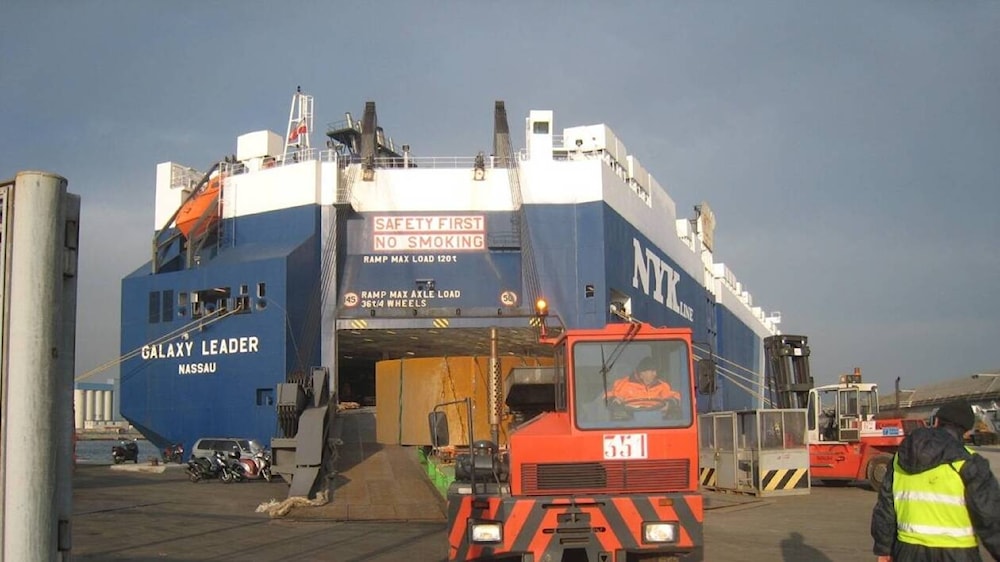Ship seized by Yemen exposed vulnerabilities in Israeli economy
The seized ship, the Galaxy Leader, is linked to a British company, according to media reports, which is partially owned by the Israeli businessman Abraham Ungar.
-

The Galaxy Leader was photographed on December 9, 2007, in an unspecified location (social media)
In a significant development in the Red Sea, the Yemeni Armed Forces captured an Israeli-owned vessel today, marking a notable escalation in operations against the Israeli occupation regime in support of Gaza.
The seized ship, the Galaxy Leader, is linked to a British company, according to media reports, which is partially owned by the Israeli businessman Abraham Ungar, commonly known as "Rami".
Read more: Yemen captures Israeli ship, adds to Israelis' piling crises: Sanaa
Ungar, a prominent figure in Israeli business circles, is the owner of Ray Shipping LTD. As of 2019, his net worth was estimated at a staggering $2.1 billion, making him one of the wealthiest individuals in the entity. His extensive wealth and business dealings have placed him at the center of the Israeli commercial landscape.
Israeli media outlets highlight Ungar's significant connections within the local political sphere, noting his involvement in various controversies that have rocked the Israeli political scene. One such incident involved former Israeli President Ezer Weizman, to whom Ungar reportedly gave $21,000 in small monthly installments. This controversy eventually led to Weizman's resignation, illustrating the extent of Ungar's influence.
Read more: The Israeli economy also a direct casualty of Al-Aqsa Flood operation
Another scandal linked to Ungar emerged in the notorious Holyland Case involving Shula Zaken, the former Chief of Staff for then Prime Minister Ehud Olmert.
During the investigation, it was revealed that Ungar was accused of bribing Zaken with $10,000 to prevent her from testifying against Olmert. These scandals underline the complex web of Ungar's connections and his impact on the Israeli political and business sectors.
The seizure of the "Galaxy Leader" vessel, despite possibly not having an Israeli crew, signifies a major blow to Ungar's interests. This incident has sent shockwaves through the Israeli business community, highlighting the vulnerabilities faced by Israeli-owned assets in contentious regions.
Read more: Israeli budget deficit soars due to expenses of aggression on Gaza
The incident not only reflects the ongoing regional tensions but also underscores the far-reaching implications of business and political entanglements in such volatile environments, and the vulnerabilities of the Israeli economy that today are the focus of the Resistance Axis until the aggression on Gaza stops.
The Yemeni operation came less than 8 hours after the country released the initial warning on Sunday, that the group intended to target any ships owned or operated by Israeli companies or bearing the Israeli flag.
"We urge countries whose nationals work in the Red Sea to stay away from any activity with Israeli ships or those owned by Israelis," the official spokesperson for the Yemeni Armed Forces, Brigadier General Yahya Saree, said on Sunday.
Read more: 'Israel' mulling demobilizing reservists over economic woes
Following the incident, there was a state of fury and confusion in "Tel Aviv," revealed by a mix of contradicting statements, even among the entity's top officials.
On the event and its impact, Israeli media said, "The Houthis continue to challenge Israel and have taken control of an Israeli ship," and the country has "threatened and then carried out their threat."
"The Houthis' control of the ship poses a problem to Israeli trade that is difficult to confront, affecting the security of cargo shipping, which will increase in cost, so Israel considers this that it is a global problem."
Read more: S&P downgrades 'Israel's' rating to negative citing 'war risks'

 4 Min Read
4 Min Read










